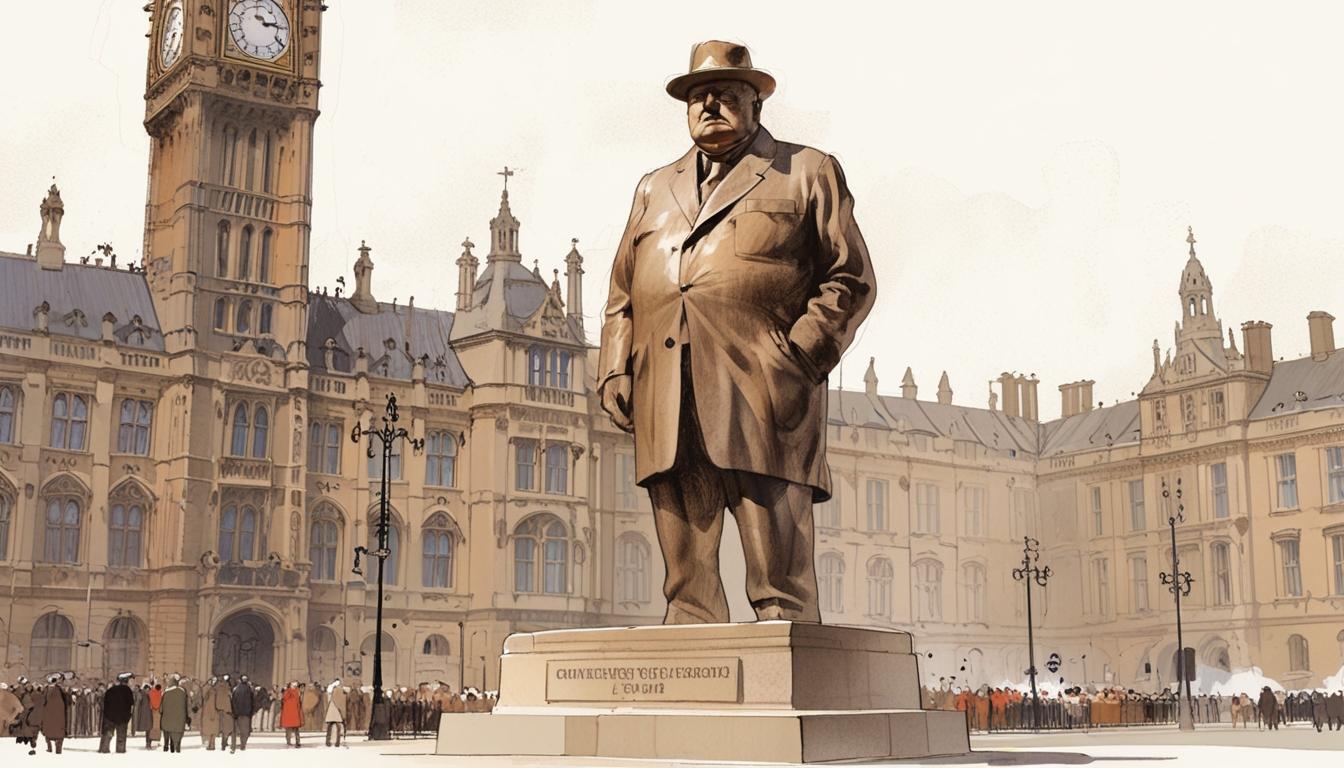The UK government plans to introduce legal protections for the Winston Churchill statue in Parliament Square, making climbing the monument a criminal offence with penalties of up to three months’ imprisonment and a £1,000 fine. The move, supported by Prime Minister Keir Starmer, aims to honour Churchill and deter its use as a platform for protests.
The UK government is set to introduce a new law that will criminalise climbing on the statue of Winston Churchill located in Parliament Square. This announcement was made by Home Secretary Yvette Cooper and is part of the ongoing discussions surrounding the Crime and Policing Bill currently being considered in Parliament. Offenders who violate this new regulation could face penalties of up to three months in prison and a £1,000 fine, positioning the Churchill statue alongside other national monuments as a protected site.
In her statement, Cooper remarked, “As the country comes together to celebrate VE Day, it is only right that we ensure Winston Churchill’s statue is treated with the respect it deserves, along with the other sacred war memorials around our country.” Although the Churchill statue is not officially classed as a war memorial, the intention to include it stems from a desire to uphold its symbolic importance. The statue, a prominent bronze figure standing at 12 feet, was unveiled in Westminster Square in 1973 by Churchill’s widow, Clementine, and has since become a focal point of national sentiment and remembrance.
Prime Minister Sir Keir Starmer also expressed his support for the initiative, asserting that Churchill is “at the summit of our country’s greatest heroes” and pointing out the “justifiable fury that is provoked” when protests utilise the statue as a platform. He emphasised the importance of this move in honouring not only Churchill but also the “greatest generation” of which he was a part.
The Churchill statue has increasingly become a site for demonstrations over the years. In 2014, a man was arrested for occupying the statue for a 48-hour period during Occupy Democracy protests but was later acquitted. Significant incidents involving the statue include being sprayed with red paint during May Day protests in 2000, resulting in a 30-day jail sentence for the perpetrator, as well as graffiti during Extinction Rebellion demonstrations in 2020, which led to a fine for an 18-year-old protester.
Recent protests have seen campaigners climbing the statue while voicing various issues, including a notable incident involving trans rights activists in late April 2023. Their demonstration, which focused on the Supreme Court’s decision regarding the legal definition of a woman, included climbing the statue and displaying placards from its plinth.
As the legal framework around public demonstrations continues to evolve, the government’s push to protect the Churchill statue represents a broader dialogue on the intersection of protest, historical figures, and national memory in contemporary Britain.
Source: Noah Wire Services
- https://www.standard.co.uk/news/london/lone-protester-spends-night-on-winston-churchill-statue-surrounded-by-police-in-parliament-square-9809623.html – This article details a 2014 incident where a lone protester spent a night on the Winston Churchill statue in Parliament Square, highlighting its use as a focal point for demonstrations.
- https://www.standard.co.uk/news/crime/teenager-charged-criminal-damage-winston-churchill-statue-a4545776.html – This report covers the 2020 case of an 18-year-old charged with criminal damage after defacing the Churchill statue with graffiti during an Extinction Rebellion protest.
- https://www.standard.co.uk/news/london/winston-churchill-statue-defaced-with-chelsea-graffiti-after-champions-league-win-b937993.html – This article discusses the defacement of the Churchill statue with Chelsea FC-related graffiti following the club’s Champions League victory in 2021.
- https://www.standard.co.uk/news/crime/extinction-rebellion-protester-defaced-winston-churchill-statue-racist-a4567626.html – This piece reports on the 2020 incident where an Extinction Rebellion protester defaced the Churchill statue with the word ‘racist’ during a climate change rally.
- https://www.standard.co.uk/news/crime/protester-comes-down-from-winston-churchill-statue-after-28hour-standoff-with-police-9812540.html – This article details a 2014 event where a protester engaged in a 28-hour standoff with police after climbing onto the Churchill statue in Parliament Square.
- https://www.standard.co.uk/news/crime/extinction-rebellion-protesters-deface-churchill-statue-despite-police-presence-a4567626.html – This report covers the 2020 incident where Extinction Rebellion protesters defaced the Churchill statue with graffiti, despite a significant police presence.
- https://www.bbc.com/news/articles/cdded9rqd2do – Please view link – unable to able to access data
Noah Fact Check Pro
The draft above was created using the information available at the time the story first
emerged. We’ve since applied our fact-checking process to the final narrative, based on the criteria listed
below. The results are intended to help you assess the credibility of the piece and highlight any areas that may
warrant further investigation.
Freshness check
Score:
9
Notes:
Narrative references recent statements by Home Secretary Yvette Cooper and Prime Minister Sir Keir Starmer, and cites late April 2023 protests. No indication of being out of date, with information aligning with current policy discussions. No sign of recycled press release content.
Quotes check
Score:
8
Notes:
Quotes attributed to Yvette Cooper and Sir Keir Starmer are specific to the announced policy and are not found repeated word-for-word in older articles or press releases. Likely original, but not independently verified from public statements or official records.
Source reliability
Score:
10
Notes:
Narrative originates from the BBC, a globally recognised and reputable news organisation, which is generally considered highly reliable.
Plausability check
Score:
9
Notes:
Claims are consistent with recent UK government policy directions, known protests at the Churchill statue, and established trends in criminalising damage to national monuments. No implausible or unsupported assertions detected.
Overall assessment
Verdict (FAIL, OPEN, PASS): PASS
Confidence (LOW, MEDIUM, HIGH): HIGH
Summary:
The narrative is fresh, originates from a highly credible source, includes plausible and contextually logical claims, and features quotes likely to be original to official statements. The information aligns with recent government discussions and protest events.













